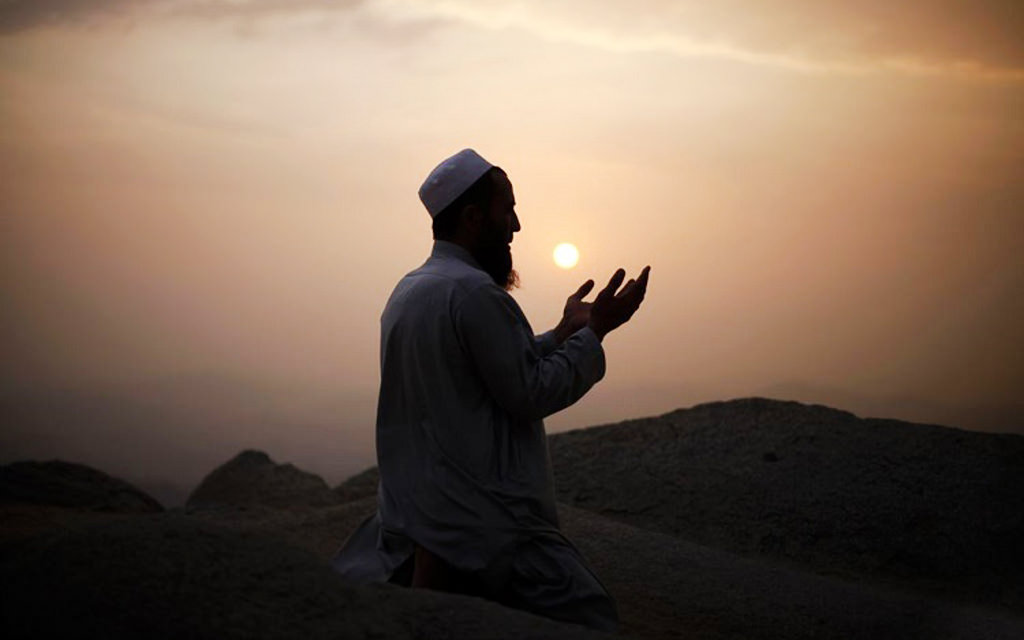People often ask, why do Muslims offer 5 times Namaz or prayers each day? Modern society thinks of it as some kind of a burden or pressure. So I would like to accentuate something on this subject today.
It is clearly said in the Quran that the basic purpose of life is to worship Allah. Through Namaz also called Salat or Salah, one can communicate directly with Allah Almighty. Additionally, it restrains the person from bad habits and evil deeds. The Holy Prophet (S.A.W), in His Hadith, mentions that the key to heaven is Salah.
Namaz, a word, binds every Muslim on this planet from a thread that connects them to Allah. It offers a wise path to His devotee to connect and know Allah better. Muslims perform five times prayers a day as it is obligatory. If you do not offer prayers, Allah will punish you on the day of judgment.
It is necessary for men to offer the prayer at Masjid with Juma’at while women are supposed to offer the prayer at their homes. The prayers must be said while facing in the direction of Mecca, the birthplace of the Prophet Muhammad.
Adhan, A Call To Prayer
In Muslim communities, people are reminded of the salat by the daily calls to prayer, known as adhan. The adhan is delivered from mosques by a muezzin, the mosque’s designated caller of prayer. During the call to prayer, the muezzin recites the Takbir and the Kalimah.
When Was The Prayer Made Compulsory?
According to the Ahadith, on the night of Mi’raj – the journey of Prophet Muhammad (SAW) towards heaven on the 27th Rajab, prayer was made compulsory. During that journey, Allah gifted the prayer i.e. Namaz to his dearest Prophet, Muhammad(SAW).
The importance of namaz has been well documented in the Quran, Hadith, and many Islamic books. All it was said during Mi’raj was that every Muslim male or female has to offer the prayer, 5 times a day as there is no exemption from prayer. Whosoever does not perform this important religious obligation is breaking Islamic law and will be punished on Judgement day.
Wudu Before Namaz
Before going to offer the prayer, it is compulsory to perform the ablution (wudu). It is done by the washing of the hands, feet, arms, and legs, called Wudu, before praying. It stimulates biological active spots similar to Chinese Reflex Therapy. And helps relax the nervous system and eases tension, stress, and anxiety. Once the Wudhu has been completed, it’s time to find a place to pray.
The 5 Times Namaz Prayer
Basically, the namaz times are set according to the movement of the sun. The five times namaz names are:
- Fajr
- Zuhar (Duhr)
- Asar
- Maghrib
- Isha
Every namaz or salah has a different meaning and benefit for the devotees. Let’s get started with the meaning and benefits of the above-listed 5 times namaz one by one.
1. Fajr (Morning Prayer)
The time for this prayer starts at the beginning of dawn and remains till the sun rises. It is 4 Rakat prayer – 2 Rakats Fard and 2 Rakats Sunnah. It is challenging to wake up early in the morning for prayer. However, praying at the beginning of the day, lighten up your day. It gives you positive energy and guidance. The Hadith says, that whoever offers the Fajr prayers, Allah will protect him throughout the day. So, try to offer Fajr prayers to seek the protection and blessings of Allah Almighty throughout the day. Early in the morning, angels are sent by Allah Almighty to witness the Muslims who are offering Fajr prayers. So, it is important to offer Fajr prayer as it saves us from hell.
2. Zuhar (Noon Prayer)
After the first prayer, Muslims perform their second prayer which is Zuhar(Dhuhr). They start with daily routine jobs by offering the Zuhar prayer at noon. This prayer comprises of 4 Rakats of Sunnah, 4 Rakat Farz, then 2 Rakat Sunnah, and 2 Rakat Nafl. The Hadith clearly says that during the Zuhr hour, the gates of heaven are opened. So, it is important to do good deeds at this time. And offering Salah is the most important at that time. Allah Almighty showers his blessings on you if you offer Zuhr prayers and will shield you from the fire of Hell on the day of judgment. You probably will have no reward for any other good deeds you have done in life, as such if you miss this prayer.
3. Asar (Afternoon Prayer)
After the Zuhar prayer, it is time for the Asar prayer and it’s time that starts in the afternoon. This prayer comprises of 4 Rakat Sunnah before offering 4 Rakat Fard prayer. 4 Rakat Sunnah is Gair-Muqtada which means it is rewardful if you pray but no sin if you leave it. The Hadith mentions that whoever offers the Fajr and Asar prayers enters the Jannah. This prayer saves you from hell and opens the door of Jannah for you.
Allah will give you success in life as well as in the hereafter. Asar prayer is important for your health and family. To increase your wealth, it is important to offer Asar prayers regularly.
4. Maghrib (Evening Prayer)
The time for Maghrib prayer starts immediately after the sunset but is offered before it is dark outside and the red light in the sky has vanished. It has 7 Rakats which are 3 Rakats Fard, 2 Rakats Sunnah, and 2 Rakats Nafl. If you miss the Maghrib prayers, Allah will punish you in this world and also in the hereafter. Allah will take away all his blessings from you. Your Dua’s are not fulfilled and at the time of death, Allah will disgrace the person who does not perform his prayers.
5. Isha (Night Prayer)
The last prayer of the day is the Isha prayer and its time starts when the time of Maghrib prayer ends and remains until midnight. It includes a total of 17 Rakats encompassing 4 Rakats Sunnah, 4 Rakats Fard, 2 Rakat Sunnah, 2 Rakat Nafil, 3 Witr, and 2 Rakat Nafl. If you offer this prayer, Allah will reward you. So, make sure that you never miss the Isha prayers. Allah will listen to your dua and will shower his blessings on you.
As it is the last prayer of the day, if you offer your prayer before sleep, you have a more peaceful night. For a peaceful sleep, it is important to offer your prayers before sleep.
However, there are also other Muslim prayers along with these five compulsory prayers. They are:
- Jumma prayer (offered only on Friday noon)
- Tahjjud prayer (offered late at night but it is not a compulsory prayer)
- Tarawih prayer (offered with the Isha prayer only in the Holy month of Ramadan)
- Eid prayers (offered on the day of Eid ul Fitr and Eid al Adha.
Benefits of 5 times Namaz
Offering Namaz (Salat) has many benefits such as spiritual, religious, physical, mental, social, economic, social, etc. Just like Yoga, offering Namaz relaxes your mind and soul. It is highly beneficial to activate all seven Chakras as per the Yogic philosophy. It is highly beneficial for body muscles and blood circulation.
Namaz is one of the finest forms of meditation where you put your focus on God generously. It relieves stress and forms peace of mind that ultimately prevents diseases. It enhances concentration and reduces the level of depression. It keeps you fit as it involves stretching of muscles which burns extra calories. Hence, you get a flexible body and prevent obesity. It also keeps the balance of the Anabolic and Catabolic biochemical processes of the body.
Benefits of different postures in Namaz
- Standing Posture (Qiya’m)
It ensures proper blood flow to the lower portion of your body which in turn strengthens leg muscles. - Forward bending (Ruk’u)
This posture is good for your lower vertebral column. It relieves and prevents back pain. It involves stretching of elbows, wrists, knees, and ankles, thus developing flexibility around all these areas of the body. The abdominal pressure in Ruk’u promotes a sort of massage to the kidney that prevents and cures kidney-related diseases. - Sitting posture
The posture is exactly similar to Vajrasana, one of the most significant poses in Yoga. It strengthens the thigh and calf muscles, improves digestion, and turns your spine straight and erect. - Sajdah
Sajdah maintains blood flow to the brain and stimulates the pituitary gland and pineal gland. This reduces the chances of brain hemorrhage and headaches. The Sajadah also involves acupressure of the toes which relieves body aches. - Salam
Salam is one form of neck yoga. It develops flexibility in neck muscles and bones that relaxes the shoulders and upper back.
In a nutshell…
Offering 5 times Namaz a day is one of the most important pillars of Islam. However, circumstances do sometimes arise where prayer time may be missed. Tradition dictates that Muslims should make up their missed prayer as soon as possible after they miss out.
I did try collaborating all the information about Namaz and its meaning. If you would like to add your points or suggest improvements then please let me know in the comments below.
▸ Interesting read: 40+ Startup Terms Every Startup Founder & Entrepreneur Should Know






Jakallahu kaeran. I am so much excited for this info as my daughter has been asking for the meaning of each Namaz.
We are glad that you liked it 🙂
The second Pillar of Islam is prayer, or Salat. Allah has commanded Muslims to obligatory prayer, 5 times a day.
Really, i impressed with your valuable meaningful information in regards of Namaj with its significance. No doubt, Yoga benifits can be achieved by performing the Namaj regularly. Hopes, in future more meaningful information will be highlighted in respect of Namaj. Thanks with Aamin.
Hello sister,
I’m glad you gave such valuable information…
I’m a Hindu but passionate about reading on simultaneous religious beliefs n religions as well…
Kindly update the link of each namaaz along with translation for non Islamic people…
Thank you
Regards
Jai Hind
An amazing intense read about namaz its meaning its benefits and most importantly its necessity ….thank you for this information… May Allah Bless You
It’s good that you liked it. ?
Salaam.. Truely i find this article beautiful; very simple to read and digest and i also find aditive to my experience. I love it with passion.
Beautiful artical
An educative write up. Thanks. Regards!
Shukraan. I am a new Muslim woman, took my Shahada in May this year. So everything I can learn I want to soak up like a sponge. I was wondering about the 5 names of prayer and their meaning. Your writing has answered by question
Very grateful
Cheryl
The article does provide a food for thought.
This is a beautiful writeup,i have learnt a lot from this and i praise Allah for this.May Allah reward you.
Subhanallah
Really im impressed (in the name of Allah today I gain a useful think in my life )….bcoz the one word of namaz covered everything no words to say….
I belive allah …